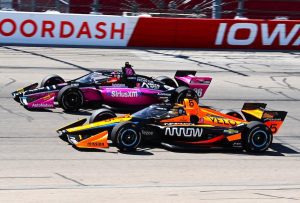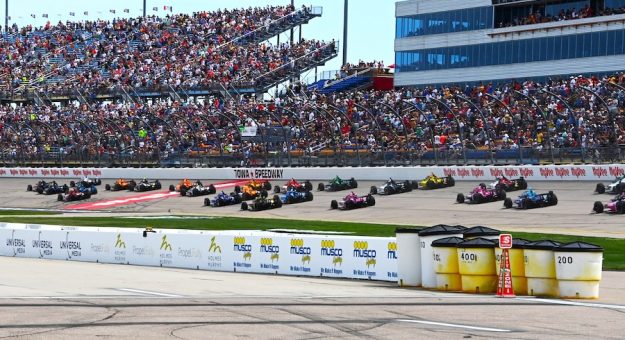Two races, four concerts and a heavy promotional effort packed the grandstands at Iowa Speedway on back-to-back days last July, and the company reports ticket sales for this year are selling at a higher rate.
The weekend creates a unique challenge for competitors.
It’s essentially a double-points weekend, with a maximum of 108 points available to a driver if he scored max points in both races. That could help shape the remaining contenders for the NTT IndyCar Series championship.
Chip Ganassi Racing driver Alex Palou dominated the middle portion of the season, winning four of five races and leading the standings by 110 points entering the July 15 event in Toronto.

If Palou sweeps both races in Iowa, he would be in full control of the championship. But if he has a bad weekend at Iowa, it could tighten the title fight.
“It’s huge,” Palou said of the doubleheader. “For everybody, it’s a big weekend with a double race. We didn’t perform as we wanted last year, so it’s good to have a full day here with four cars and 15 other cars on track because it makes you able to compare to everybody else and not make you feel that you are better than you really are.”
The .875-mile track is demanding to drive for one race, imagine how difficult it is on back-to-back days in the July heat.
“It’s tough for everybody,” Palou said. “For the teams, mechanics and engineers. It’s a bumpy track, it’s a fast track, you don’t have much time to rest and it’s crazy hot. We’ll try to hydrate as much as possible ahead of the weekend.”
Ron Ruzewski is the managing director at Team Penske. He oversees the three-car operation for two-time NTT IndyCar champion and Indianapolis 500 winner Josef Newgarden, two-time IndyCar champion and 2018 Indy 500 winner Will Power and race winner Scott McLaughlin.
“The biggest thing going into the doubleheader weekends is you have to be prepared for the worst case if you have carnage,” Ruzewski explained. “You are either collected in something or have to repair something and how to be best situated for the next day’s event.
“That is the biggest preparation that has to be done. You have to have enough components ready whether it’s cars, parts, sub-assemblies, everything ready to be able to turn around rapidly. Logistically, that’s the biggest thing.”
Preparing for a doubleheader means anticipating what can happen if things go wrong.
“Unless it’s a major crash where we damage the tub, we will rebuild the car, so you have to bring everything for the back of the car and bodywork for it,” Ruzewski explained. “We’ll have multiple sets of that.
“Generally, we’ll bring two extra cars and a third rear-end assembly only.
“Because we have garages there, we don’t need everything for the tents, so we have enough room and can get everything there.”
Team Penske and the other IndyCar teams understand the competitive and performance aspects of the doubleheader weekend.
“The next thing is be prepared on the performance front because it’s a double-points weekend,” Ruzewski said. “There are 108 points up for grabs. You want to capitalize on that and make the most of it.
“Historically, we’ve had really good runs at Iowa, but the competition is so tough anymore. Teams went there and tested this year. We had to make our decision on where to test. We chose to go to Road America; others chose to go to Iowa.
“We’ll see what it brings but from a preparation standpoint, you have to be prepared for anything.”
It is also very hot in Iowa in mid-July with temperatures that can exceed 100 degrees.
